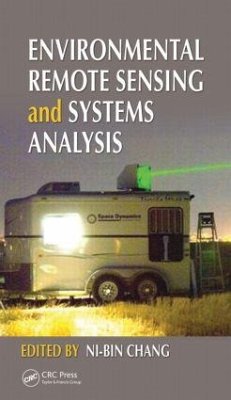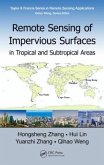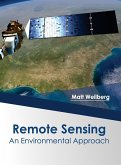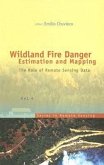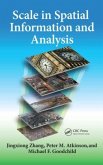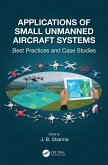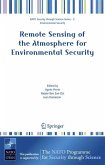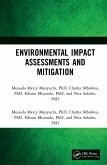Environmental Remote Sensing and Systems Analysis
Herausgeber: Chang, Ni-Bin
Environmental Remote Sensing and Systems Analysis
Herausgeber: Chang, Ni-Bin
- Gebundenes Buch
- Merkliste
- Auf die Merkliste
- Bewerten Bewerten
- Teilen
- Produkt teilen
- Produkterinnerung
- Produkterinnerung
Reflecting the dramatic changes in the field due to global climate change, economic development, and population growth, this book presents an integrated, quantitative, systems-level method of remote sensing that is essential for tracking down the dynamics of coupled natural and human systems. It provides systematic coverage of water quality monitoring, air quality monitoring, and land-use patterns and degradation, from the urban to the global scale. Focusing on applications to enhance field-oriented problem solving, it explores new methods and techniques to demonstrate state-of-the-art accomplishments and future trends in remote sensing.…mehr
Andere Kunden interessierten sich auch für
![Remote Sensing of Impervious Surfaces in Tropical and Subtropical Areas Remote Sensing of Impervious Surfaces in Tropical and Subtropical Areas]() Hongsheng ZhangRemote Sensing of Impervious Surfaces in Tropical and Subtropical Areas169,99 €
Hongsheng ZhangRemote Sensing of Impervious Surfaces in Tropical and Subtropical Areas169,99 €![Remote Sensing: An Environmental Approach Remote Sensing: An Environmental Approach]() Remote Sensing: An Environmental Approach121,99 €
Remote Sensing: An Environmental Approach121,99 €![Wildland Fire Danger Estimation and Mapping: The Role of Remote Sensing Data Wildland Fire Danger Estimation and Mapping: The Role of Remote Sensing Data]() Wildland Fire Danger Estimation and Mapping: The Role of Remote Sensing Data147,99 €
Wildland Fire Danger Estimation and Mapping: The Role of Remote Sensing Data147,99 €![Scale in Spatial Information and Analysis Scale in Spatial Information and Analysis]() Jingxiong ZhangScale in Spatial Information and Analysis264,99 €
Jingxiong ZhangScale in Spatial Information and Analysis264,99 €![Applications of Small Unmanned Aircraft Systems Applications of Small Unmanned Aircraft Systems]() Applications of Small Unmanned Aircraft Systems174,99 €
Applications of Small Unmanned Aircraft Systems174,99 €![Remote Sensing of the Atmosphere for Environmental Security Remote Sensing of the Atmosphere for Environmental Security]() Agnès Perrin / Najate Ben Sari-Zizi / Jean Demaison (eds.)Remote Sensing of the Atmosphere for Environmental Security112,99 €
Agnès Perrin / Najate Ben Sari-Zizi / Jean Demaison (eds.)Remote Sensing of the Atmosphere for Environmental Security112,99 €![Environmental Impact Assessments and Mitigation Environmental Impact Assessments and Mitigation]() Musaida Mercy ManyuchiEnvironmental Impact Assessments and Mitigation136,99 €
Musaida Mercy ManyuchiEnvironmental Impact Assessments and Mitigation136,99 €-
-
-
Reflecting the dramatic changes in the field due to global climate change, economic development, and population growth, this book presents an integrated, quantitative, systems-level method of remote sensing that is essential for tracking down the dynamics of coupled natural and human systems. It provides systematic coverage of water quality monitoring, air quality monitoring, and land-use patterns and degradation, from the urban to the global scale. Focusing on applications to enhance field-oriented problem solving, it explores new methods and techniques to demonstrate state-of-the-art accomplishments and future trends in remote sensing.
Produktdetails
- Produktdetails
- Verlag: CRC Press
- Seitenzahl: 520
- Erscheinungstermin: 23. März 2012
- Englisch
- Abmessung: 241mm x 165mm x 53mm
- Gewicht: 2077g
- ISBN-13: 9781439877432
- ISBN-10: 1439877432
- Artikelnr.: 33302448
- Herstellerkennzeichnung
- Libri GmbH
- Europaallee 1
- 36244 Bad Hersfeld
- gpsr@libri.de
- Verlag: CRC Press
- Seitenzahl: 520
- Erscheinungstermin: 23. März 2012
- Englisch
- Abmessung: 241mm x 165mm x 53mm
- Gewicht: 2077g
- ISBN-13: 9781439877432
- ISBN-10: 1439877432
- Artikelnr.: 33302448
- Herstellerkennzeichnung
- Libri GmbH
- Europaallee 1
- 36244 Bad Hersfeld
- gpsr@libri.de
Dr. Ni-Bin Chang is currently a professor with the Department of Civil, Environmental, and Construction Engineering at the University of Central Florida. He is also a senior member of the Institute of Electronics and Electrical Engineers (IEEE) and is affiliated with the IEEE Geoscience and Remote Sensing Society and the IEEE Computational Intelligence Society. He has earned the selectively awarded titles of Certificate of Leadership in Energy and Environment Design (LEED) in 2004, Board Certified Environmental Engineer (BCEE) in 2006, Diplomat of Water Resources Engineer (DWRE) in 2007, elected Member of the European Academy of Sciences (EAS) in 2008, elected Fellow of the American Society of Civil Engineers (ASCE) in 2009, and elected Fellow of the American Association for the Advancement of Science (AAAS) in 2011. He was one of the founders of International Society of Environmental Information Management and the former editor-in-chief of the Journal of Environmental Informatics. He is currently an editor, associate editor, or editorial board member of more than 30 international journals.
Linkages between Environmental Remote Sensing and Systems Analysis. Water
Quality Monitoring, Watershed Development, and Coastal Management: Using
Remote Sensing-Based Carlson Index Mapping to Assess Hurricane and Drought
Effects on Lake Trophic State. Mapping Potential Annual Pollutant Loads in
River Basins Using Remotely Sensed Imagery. Identifying the Impact of Oil
Spills with the Remote Sensing- Based Oil Spread Index Method. Remote
Sensing to Predict Estuarine Water Salinity. Multitemporal Remote Sensing
of Coastal Sediment Dynamics. Estimating Total Phosphorus Impacts in a
Coastal Bay with Remote Sensing Images and In Situ Measurements. Monitoring
and Mapping of Flood Plumes in the Great Barrier Reef Based on In Situ and
Remote Sensing Observations. Sensing and Monitoring for Land Use Patterns,
Reclamation, and Degradation: Satellite Remote Sensing for Landslide
Prediction. Analysis of Impervious Surface and Suburban Form Using High
Spatial Resolution Satellite Imagery. Use of InSAR for Monitoring Land
Subsidence in Mashhad Subbasin, Iran. Remote Sensing Assessment of Coastal
Land Reclamation Impact in Dalian, China, Using High-Resolution SPOT Images
and Support Vector Machine. Mapping Impervious Surface Distribution with
the Integration of Landsat TM and QuickBird Images in a Complex Urban-
Rural Frontier in Brazil. Air Quality Monitoring, Land Use/Land Cover
Changes, and Environmental Health Concern: Using Lidar to Characterize
Particles from Point and Diffuse Sources in an Agricultural Field.
Measurement of Aerosol Properties over Urban Environments from Satellite
Remote Sensing. DOAS Technique: Emission Measurements in Urban and
Industrial Regions. Interactions between Ultraviolet-B and Total Ozone
Concentrations in the Continental United States. Remote Sensing of Asian
Dust Storms. Forest Fire and Air Quality Monitoring from Space. Satellite
Remote Sensing of Global Air Quality.
Quality Monitoring, Watershed Development, and Coastal Management: Using
Remote Sensing-Based Carlson Index Mapping to Assess Hurricane and Drought
Effects on Lake Trophic State. Mapping Potential Annual Pollutant Loads in
River Basins Using Remotely Sensed Imagery. Identifying the Impact of Oil
Spills with the Remote Sensing- Based Oil Spread Index Method. Remote
Sensing to Predict Estuarine Water Salinity. Multitemporal Remote Sensing
of Coastal Sediment Dynamics. Estimating Total Phosphorus Impacts in a
Coastal Bay with Remote Sensing Images and In Situ Measurements. Monitoring
and Mapping of Flood Plumes in the Great Barrier Reef Based on In Situ and
Remote Sensing Observations. Sensing and Monitoring for Land Use Patterns,
Reclamation, and Degradation: Satellite Remote Sensing for Landslide
Prediction. Analysis of Impervious Surface and Suburban Form Using High
Spatial Resolution Satellite Imagery. Use of InSAR for Monitoring Land
Subsidence in Mashhad Subbasin, Iran. Remote Sensing Assessment of Coastal
Land Reclamation Impact in Dalian, China, Using High-Resolution SPOT Images
and Support Vector Machine. Mapping Impervious Surface Distribution with
the Integration of Landsat TM and QuickBird Images in a Complex Urban-
Rural Frontier in Brazil. Air Quality Monitoring, Land Use/Land Cover
Changes, and Environmental Health Concern: Using Lidar to Characterize
Particles from Point and Diffuse Sources in an Agricultural Field.
Measurement of Aerosol Properties over Urban Environments from Satellite
Remote Sensing. DOAS Technique: Emission Measurements in Urban and
Industrial Regions. Interactions between Ultraviolet-B and Total Ozone
Concentrations in the Continental United States. Remote Sensing of Asian
Dust Storms. Forest Fire and Air Quality Monitoring from Space. Satellite
Remote Sensing of Global Air Quality.
Linkages between Environmental Remote Sensing and Systems Analysis. Water
Quality Monitoring, Watershed Development, and Coastal Management: Using
Remote Sensing-Based Carlson Index Mapping to Assess Hurricane and Drought
Effects on Lake Trophic State. Mapping Potential Annual Pollutant Loads in
River Basins Using Remotely Sensed Imagery. Identifying the Impact of Oil
Spills with the Remote Sensing- Based Oil Spread Index Method. Remote
Sensing to Predict Estuarine Water Salinity. Multitemporal Remote Sensing
of Coastal Sediment Dynamics. Estimating Total Phosphorus Impacts in a
Coastal Bay with Remote Sensing Images and In Situ Measurements. Monitoring
and Mapping of Flood Plumes in the Great Barrier Reef Based on In Situ and
Remote Sensing Observations. Sensing and Monitoring for Land Use Patterns,
Reclamation, and Degradation: Satellite Remote Sensing for Landslide
Prediction. Analysis of Impervious Surface and Suburban Form Using High
Spatial Resolution Satellite Imagery. Use of InSAR for Monitoring Land
Subsidence in Mashhad Subbasin, Iran. Remote Sensing Assessment of Coastal
Land Reclamation Impact in Dalian, China, Using High-Resolution SPOT Images
and Support Vector Machine. Mapping Impervious Surface Distribution with
the Integration of Landsat TM and QuickBird Images in a Complex Urban-
Rural Frontier in Brazil. Air Quality Monitoring, Land Use/Land Cover
Changes, and Environmental Health Concern: Using Lidar to Characterize
Particles from Point and Diffuse Sources in an Agricultural Field.
Measurement of Aerosol Properties over Urban Environments from Satellite
Remote Sensing. DOAS Technique: Emission Measurements in Urban and
Industrial Regions. Interactions between Ultraviolet-B and Total Ozone
Concentrations in the Continental United States. Remote Sensing of Asian
Dust Storms. Forest Fire and Air Quality Monitoring from Space. Satellite
Remote Sensing of Global Air Quality.
Quality Monitoring, Watershed Development, and Coastal Management: Using
Remote Sensing-Based Carlson Index Mapping to Assess Hurricane and Drought
Effects on Lake Trophic State. Mapping Potential Annual Pollutant Loads in
River Basins Using Remotely Sensed Imagery. Identifying the Impact of Oil
Spills with the Remote Sensing- Based Oil Spread Index Method. Remote
Sensing to Predict Estuarine Water Salinity. Multitemporal Remote Sensing
of Coastal Sediment Dynamics. Estimating Total Phosphorus Impacts in a
Coastal Bay with Remote Sensing Images and In Situ Measurements. Monitoring
and Mapping of Flood Plumes in the Great Barrier Reef Based on In Situ and
Remote Sensing Observations. Sensing and Monitoring for Land Use Patterns,
Reclamation, and Degradation: Satellite Remote Sensing for Landslide
Prediction. Analysis of Impervious Surface and Suburban Form Using High
Spatial Resolution Satellite Imagery. Use of InSAR for Monitoring Land
Subsidence in Mashhad Subbasin, Iran. Remote Sensing Assessment of Coastal
Land Reclamation Impact in Dalian, China, Using High-Resolution SPOT Images
and Support Vector Machine. Mapping Impervious Surface Distribution with
the Integration of Landsat TM and QuickBird Images in a Complex Urban-
Rural Frontier in Brazil. Air Quality Monitoring, Land Use/Land Cover
Changes, and Environmental Health Concern: Using Lidar to Characterize
Particles from Point and Diffuse Sources in an Agricultural Field.
Measurement of Aerosol Properties over Urban Environments from Satellite
Remote Sensing. DOAS Technique: Emission Measurements in Urban and
Industrial Regions. Interactions between Ultraviolet-B and Total Ozone
Concentrations in the Continental United States. Remote Sensing of Asian
Dust Storms. Forest Fire and Air Quality Monitoring from Space. Satellite
Remote Sensing of Global Air Quality.

